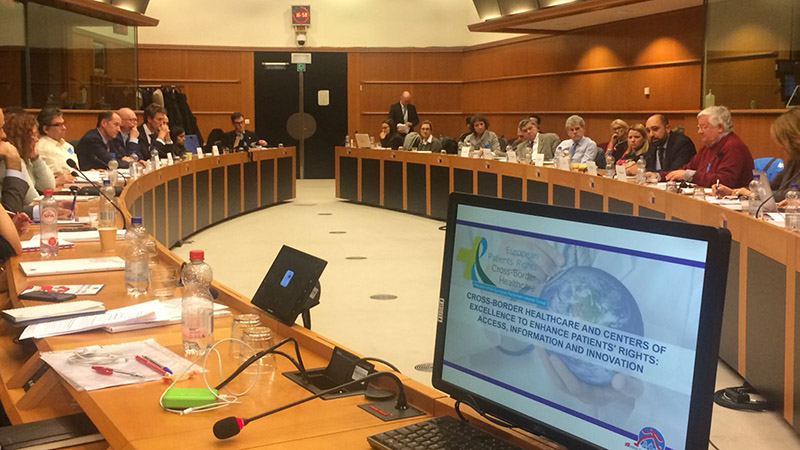
Summary
Active Citizenship Network is organizing in the European Parliament on the 27 of February from 15.00 to 17:00 the meeting titled:
"Cross-border healthcare and centers of excellence to enhance patients' rights:
access, information and innovation"
CLICK HERE TO SEE THE PROGRAMME, THE SPEAKERS' BIOGRAPHIES, THE PICTURES OF THE EVENT
CLICK HERE to participate by 16th February 2018 (sorry the registration is closed!)
It will be hosted by the MEP Patrizia Toia in the framework of the MEPs Interest Group “European Patients’ Rights & Cross-Border Healthcare”.
The initiative represents the final event of the two years of campaigning to raise awareness on cross-border healthcare titled “Patients’ rights have no borders”, realized by Active Citizenship Network thanks to the support of Novartis.
After two years of activities across Europe, Active Citizenship Network has decided to develop it further and plan a widespread activity focused on the European Reference Networks and on patients’ rights with regard to rare or complex disease.
Starting from data and proposals by Active Citizenship Network, the event will offer an open debate between civic and patient associations from different Member States, experts, Institutional representatives from the European Parliament and the European Commission, ERNs and several stakeholders at EU level.
Framework
In Europe, there are approximately 30 million people living with rare diseases and disorders. The EU and national governments are committed to improving the recognition and treatment of these rare and complex conditions by strengthening European-level cooperation and coordination and supporting national plans for rare diseases.
Directive 2011/24/EU on the application of patients’ rights in cross-border healthcare has provided a framework for the development of European Reference Networks (ERNs) between healthcare providers and Centres of Expertise in Member States, in particular in the area of rare diseases (articles no. 12 and 13). ERNs officially came into operation in March 2017 as virtual networks of healthcare providers across Europe, aiming at tackling complex or rare diseases and conditions that require highly specialised treatment and/or a concentration of knowledge and resources. The main purpose of these networks is to improve clinical care for rare disease patients by, among other things, facilitating the pooling and exchange of knowledge and expertise as well as the development of procedures and guidelines in order to ensure equal access to accurate information, appropriate and timely diagnoses and highly specialised and high-quality care for rare disease patients.
On 16 June 2017, the Maltese Presidency of the Council of the European Union on Employment, Social Policy, Health and Consumer Affairs adopted its conclusions on “Encouraging Member States-driven Voluntary Cooperation of Health Systems”.
The Health Ministers have recognised that European Reference Networks (ERNs), when fully developed, present an opportunity for building capacity throughout Europe in the provision of specialised health services, in particular in the field of rare diseases, so as to ensure quality of care, and dissemination of knowledge and innovative practices.
Thus, the Council has invited the Member States and the Commission to encourage the ERNs to attain their intended objectives of providing better access for patients requiring highly specialised healthcare. Member States and the Commission should therefore evaluate the readiness and capacity of ERNs to offer highly specialised training and continuous professional development for health professionals, and reflect on ways to stimulate innovative research on very rare diseases through ERNs, to pool evidence on the effectiveness of innovative technologies and to capture comparable and reliable data from interoperable patient registries, as well as other relevant information.
Recently, the high attention to the topic at EU level it was also confirmed by the Annual Work Programme 2018 of the Health Programme of the EU Commission-DG Santè, adopted on 13 December 2017.
ACN strongly believes that these goals could be reached also thanks a more active role of the broader constituency of advocacy groups and patients associations: in terms of raise awareness European citizens about it, increasing dialogue and exchange of experiences, collection of data & good practices, removing barriers & obstacles.
A collaborative approach: challenging borders and geography
ERNs are not meant to be operating in isolation: their impact should be much broader, as they mark a new chapter in European cooperation in the field of healthcare. ERNs could serve as a platform for the development of eHealth tools and could even see greater cooperation on more common chronic illnesses too. They are a clear example of how it is possible to work together to add value for citizens; they are a concrete opportunity to come together to speak about shared challenges in healthcare and to think beyond borders.
Patient organisations – together with all the relevant stakeholders - across Europe should therefore play an active role in facilitating access to and sharing of information flow on healthcare, promoting patients’ empowerment, and bridging the gap between patients’ and institutions/providers and thus increasing patients’ treatment options.
Read more on our commitment on the topic:
- The commitment of Active Citizenship Network on cross-border healthcare
- “Patients' rights have no borders”
- Press releases
- Download the leaflet in your language
Previous events:


